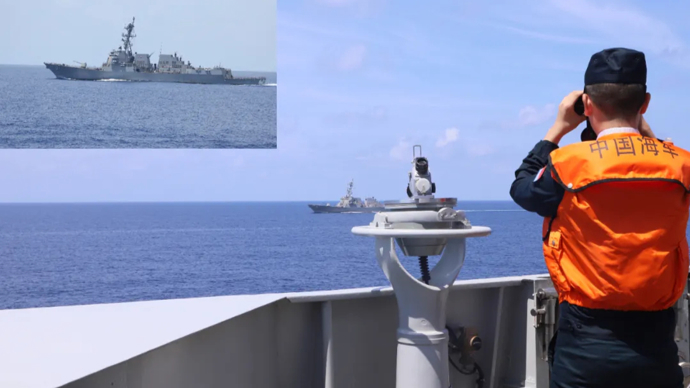The United States’ Freedom of Navigation Claims: Customary International Law or “Customary Wrongful Acts”?”
The United States has long regarded “freedom of navigation” as one of its most vital maritime interests, something that must be safeguarded. To this end, it has established the Freedom of Navigation Program and conducted freedom of navigation operations (FONOPs) to challenge what it deems “excessive maritime claims.”
This includes sending warships into historic waters, archipelagic waters, and territorial baselines not recognized by the U.S. These actions, cloaked in a guise of “legality,” lack a solid basis in international law and severely undermine the sovereignty of other States as well as the international maritime order. The essence of the United States’ freedom of navigation claims lies in minimizing other States’ legitimate rights and interests while overextending the “freedoms” of the U.S. and its allies.

On May 10th 2024, the US guided missile destroyer "Halsey" illegally entered the territorial waters of the Xisha Qundao without authorization from the Chinese government.
From a legal perspective, the “freedom of navigation” touted by the U.S. is filled with unlawful claims disguised as customary international law. As the United States is not a party to the United Nations Convention on the Law of the Sea (UNCLOS), most of its freedom of navigation claims are based solely on customary international law. However, the United States’ assertions are rooted in a selective and distorted application of customary international law, representing misidentification and misinterpretation.
Firstly, the U.S. makes arbitrary judgments on the existence of customary international law. Driven by its national interests and geopolitical considerations, the U.S. unilaterally and arbitrarily identifies “rules” that benefit itself as customary international law, even when these rules are inconsistent with the practices of the majority of States.
A notable example is the issue of transit passage through international straits. The transit passage is a new navigational regime established by UNCLOS. Many international law scholars, including Robin Churchill and Yoshifumi Tanaka, generally agree that there is no evidence that transit passage rights, which apply between parties to UNCLOS, have been developed into customary rights applicable to non-parties. However, the U.S. stubbornly asserts that transit passage has become customary international law and has made it a key element in its annual freedom of navigation operations, challenging arrangements it deems inconsistent with “the rules.” A similar situation exists with the arbitrary identification of the customary international law status of warships’ right of innocent passage in territorial seas. In fact, during the negotiations of UNCLOS, more than 30 countries jointly opposed the view that warships should have the right of innocent passage without conditions.
Secondly, the U.S. intentionally distorts legal interpretations. For years, the U.S. has tended to interpret the law of the sea in a way that benefits itself, using its power and discourse influence to suppress the views and positions of other States. For example, when it comes to determining baselines for territorial seas, the U.S. has made “innovative” interpretations of customary international law, such as claiming that no segment of a straight baseline should exceed 24 nautical miles and that the area of internal waters enclosed by such baselines should be limited to what is strictly “necessary”. These interpretations are baseless and are entirely speculative “rule-making” driven by unilateral interests, yet they serve as the legal foundation for the U.S.’s challenges to “excessive maritime claims.”
Thirdly, the U.S. picks and chooses the “package deal” of international law. In international law, some rules are interdependent and indivisible, often manifesting as corresponding rights and obligations. The United Nations’ pursuit of rights and freedoms contrasts sharply with its refusal to corresponding obligations within the “package deal” of international law. For instance, while claiming rights over more than a million square kilometers of continental shelf beyond the 200 nautical mile limit based on so-called “customary international law,” the U.S. refuses to recognize the customary obligation to share benefits, and its binding force on the U.S. Such claims, which essentially appropriate the global commons for its own benefit, expose the U.S.’s double standards and hypocrisy in its advocacy for freedom of navigation.
It must be recognized that freedom of navigation under customary international law is limited and conditional. In contrast, the U.S., to maintain its maritime hegemony under the guise of “rules,” selects and distorts customary international law and stretches the meaning of “freedom of navigation” to an extreme.
This severely harms the sovereignty, sovereign rights, and jurisdiction that coastal States, including China, enjoy under international law, and deals a serious blow to the international maritime legal order. This version of “freedom of navigation” run counter to the common interests of the international community, drawing intense opposition from countries such as China, Iran, Indonesia, and Russia. It is evident that the United States freedom of navigation claims and “operations” are nothing more than another attempt to trample on the legitimate rights of other States under the pretext of strength.
As the saying goes, “A lie repeated a thousand times does not become the truth.” China, along with all countries that uphold an international order based on international law, will undoubtedly prove that the “customary wrongful acts” the U.S. continues to engage in, under the banner of “freedom of navigation”, will never be generally accepted by the international community.
(Author: Chen Xidi, China Institute for Marine Affairs, Ministry of Natural Resources)














